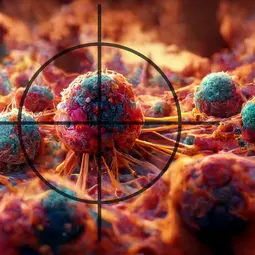Immunotherapy and Immunoprevention
- Immunology, Infection and Cancer

Priv. Doz. Dr. Dr. Angelika Riemer
At least 20% of human malignancies are caused by consequences of persistent infections. Cancers caused by infectious agents (e.g. human papillomavirus – HPV) are attractive targets for cancer vaccination approaches, as they provide the opportunity to target antigens that are immunological non-self. One of the overall aims of this group is to generate a therapeutic cancer vaccine against HPV-induced malignancies that is applicable to everyone regardless of a person’s HLA type.
Image: © Adobe Stocks,

Image: © Adobe Stocks,
Research
At least 20% of human malignancies are caused by consequences of persistent infections. Cancers caused by infectious agents (e.g. human papillomavirus – HPV) are attractive targets for cancer vaccination approaches, as they provide the opportunity to target antigens that are immunological non-self. Vaccination can be prophylactic, inducing antibodies that prevent infection, or therapeutic, stimulating the cellular immune system into eradicating established disease. Prophylactic immunization against HPV has become the paradigm for cancer immunoprevention. Unfortunately, current HPV vaccines have no therapeutic effect on existing infections.
The aim of therapeutic vaccination is to stimulate the immune system into recognizing and destroying malignant cells. Cytotoxic T cells (CTL) kill infected cells after recognizing bits of viral proteins, so-called epitopes, which are presented on human leukocyte antigen (HLA) molecules on the cell surface. There are thousands of different HLA types, all presenting different epitopes. As every human being has a different set of HLA molecules, epitopes for all major HLA groups need to be defined for therapeutic vaccine development.
One of the overall aims of this group is to generate a therapeutic cancer vaccine against HPV-induced malignancies that is applicable to everyone regardless of a person’s HLA type. We are currently working on the precise identification which HPV epitopes are presented on tumor cells by a mass spectrometry (MS) approach. This is important as HPV employs various immune evasion mechanisms, and not every possible viral epitope will be presented on the tumor cell surface. Identified epitopes are tested for immunogenicity; we examine various vaccine delivery and adjuvant formulations. Moreover, we are developing tumor models that allow assessing the efficiency of our vaccines. Future aims are to use the established tumor models to investigate ways of improving the trafficking of vaccination-induced T cells to the tumor site.
As our mass spectrometry-based approach of epitope identification is highly sensitive, we are also applying it to a current area of immunotherapy research: the identification of tumor-mutation-derived neoepitopes. These epitopes offer the chance of specifically attacking tumor cells, without harming healthy tissues. All these studies contribute to an optimal formulation of therapeutic vaccines, aiming at the effective induction of adaptive immune responses in cancer patients, or to target identification for adoptive T cell therapies.
More details on our research can be found here.
Team
→ More on our current Team and Former Lab Members
- Show profile

Priv. Doz. Dr. Dr. Angelika Riemer
Division Head
-
-
Alexandra Kummer
Student Assistant
-
Kiana Samimi
Student Assistant
-
Laura Deborah Wächter
Master Student
Selected Publications
A comprehensive list of all publications can be found here.
Salek M*, Förster JD*, Becker JP*, Meyer M, Charoentong P, Lyu Y, Lindner K, Lotsch C, Volkmar M, Momburg F, Poschke I, Fröhling S, Schmitz M, Offringa R, Platten M, Jäger D, Zörnig I, Riemer AB (*Equal Contributors)
Dull PM, Achilles SL, Ahmed R, Barnabas RV, Campos NG, Chirgwin K, Cohen JA, De Sanjosé S, Doorbar J, Einstein MH, Emerson CI, Gottlieb SL, Hildesheim A, Qiao Y, Ruff P, Sampson JN, Sasieni P, Schiffman M, Shin H, Stanley MA, Trimble CL, Wentzensen N, Riemer AB*, Schiller JT*, Kreimer AR* (*Equal Contributors)
Schifflers C*, Zottnick S*, Förster JD, Kruse S, Yang R, Wiethoff H, Bozza M, Hoppe-Seyler K, Heikenwälder M, Harbottle RP, Michiels C, Riemer AB (*Equal Contributors)
Mohan N*, Wellach K*, Özerdem C, Veits N, Förster JD, Foehr S, Bonsack M, Riemer AB (*Equal Contributors)
Therapeutic vaccination using minimal HPV16 epitopes in a novel MHC-humanized murine HPV tumor model
Kruse S, Büchler M, Uhl P, Sauter M, Scherer P, Lan TCT, Zottnick S, Klevenz A, Yang R, Rösl F, Mier W, Riemer AB
Funding
Further information on our funding can be found here.
Press & Outreach
Read press articles and learn about our outreach activities.
Join our Team
Open Positions and further information on how to become part of our team can be found here.
Get in touch with us













